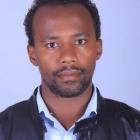
Research and policy advisor | Associate | IRC Ethiopia
Ephraim Mebrate Disasa is an associate to IRC since 1 October 2021. Prior to that Ephraim was a Research and Policy Advisor to IRC. Before joining IRC in 2019, Ephraim had been working in an International NGO, Higher Academic Institutions and Psychiatric Hospital for the last 10 years. Ephraim has track record for Market and Health Research in areas of WASH, FP, HIV, Nutrition and Mental Health. During his five and half year stay at PSI/Ethiopia, Ephraim conducted wide arrays of market and health researches geared towards programme improvements and policy influencing.
Ephraim did his baccalaureate and graduate studies from Addis Ababa University in Sociology and Social Anthropology and Social Work in Health Care Setting where he graduated with very great distinction.
Exploring existing regulatory frameworks around faecal waste management, faecal sludge accumulation rates, and associated pit filling rates. Read more...
Increasing repair and maintenance funds leads to higher borehole functionality and water access rates in the drought-prone regions of Turkana, Kenya... Read more...
Lessons learnt from WASH First COVID-19 Response Project in Ethiopia Read more...
An overview of phase II activities in Negelle Arsi and Shashamane districts in Ethiopia.. Read more...
A novel Empowerment in WASH Index is presented, which was piloted in Banfora, Burkina Faso. Findings show importance of household- and community-... Read more...
Successful pathways secured uptake by government and had flexible programming. Read more...
More emphasis is needed on building and strengthening the work of multi-stakeholder platforms in WASH at the national level. Read more...
Key elements, success factors, partnership processes, conducive national contexts and types of global partnerships, which can support an effective... Read more...
Comparing water utilities in Kenya, Ethiopia, Cambodia, and the United States reveals a gap between the full costs of service delivery and budgets of... Read more...
This guide covers steps required for engaging effectively with decision-makers; increasing the impact beyond programmatic solutions; and influencing... Read more...
Between 2017 and 2019, the District-Wide Approach for water and sanitation services was piloted in five districts in Rwanda. This Agenda for Change... Read more...
Government should take the lead in making sure WASH services are empowering; NGOs should support government in monitoring empowerment in WASH... Read more...
Conclusions and reflections on the use of the Social Accountability Model developed by Water Witness International in the Watershed programme in... Read more...
There is a gap between what organisations have formulated in their strategies and programmatic approaches regarding social inclusion and the actual... Read more...
The lack of a post-handover operation and maintenance plan for handpumps has created an "install and forget" model. Read more...
USAID Transform WASH introduced diverse sanitation products in Ethiopia, expanded availability through local businesses, and sold over 200,000... Read more...
Training local masons on the DQ Selling® approach for door-to-door sales of sanitation products in rural areas. Read more...
Key insights and calls to action on WASH and climate change from the All Systems Connect International Symposium 2023. Read more...
This learning note summarises the findings of USAID Transform WASH's activities in Ethiopia to explore progress towards universal sanitation coverage... Read more...